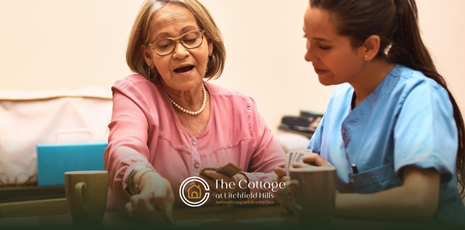Intergenerational Programs in Senior Living: Benefits & Ideas

Key Highlights
- Intergenerational programs help seniors build meaningful relationships with younger generations.
- Engaging with children and teens supports memory, reduces stress, and improves mood.
- Seniors can share life skills and wisdom while learning new perspectives from youth.
- Programs strengthen community connections and encourage participation in local activities.
- Activities include arts, music, storytelling, gardening, games, and technology mentoring.
Intergenerational programs in senior living communities are designed to foster meaningful interactions between older adults and younger generations, including children, teenagers, and young adults. These programs provide seniors with opportunities to engage socially, share experiences, and participate in dynamic learning environments while offering younger participants a chance to gain knowledge, empathy, and connection with older adults.
The Importance of Intergenerational Programs
Aging can sometimes bring social isolation and a sense of disconnection. Intergenerational programs combat these challenges by creating purposeful opportunities for seniors to engage with younger individuals. This interaction benefits both parties:
- Seniors enjoy increased social engagement, cognitive stimulation, and emotional well-being.
- Younger participants gain wisdom, historical perspective, and improved social skills.
Research shows that intergenerational activities can reduce feelings of loneliness, enhance cognitive function, and provide emotional satisfaction for seniors while fostering responsibility, empathy, and communication skills in younger participants.
Common Intergenerational Activities
1. Arts and Crafts
- Collaborative projects such as picture frame designing, beadwork, painting, and seasonal crafts bring residents and children together.
- Creative activities improve fine motor skills, encourage teamwork, and spark conversation.
2. Music and Performing Arts
- Choirs, instrumental groups, and dance workshops allow seniors and younger generations to explore music together.
- Singing familiar songs can trigger memory recall for older adults and strengthen bonds across generations.
3. Gardening and Nature Programs
- Joint gardening activities, planting flowers or vegetables, offer physical activity and sensory stimulation.
- Working side by side fosters mentorship and shared responsibility.
4. Technology Mentoring
- Seniors can learn basic technology skills from teens, while teaching younger participants about history, life skills, and personal hobbies.
- This mutual exchange promotes confidence and reduces generational gaps.
5. Storytelling and Oral History
- Residents share life stories, traditions, and experiences, creating a sense of continuity and personal connection.
- Children can document stories through art, video, or writing projects, making the experience interactive.
Benefits of Intergenerational Programs
| Program Type | Senior Benefits | Younger Participant Benefits | Examples of Activities |
|---|---|---|---|
| Arts & Crafts | Improves dexterity, cognitive stimulation | Enhances creativity, teamwork | Painting, beading, holiday crafts |
| Music & Performing Arts | Boosts memory, reduces stress | Encourages musical skill development | Choirs, dance, instrument workshops |
| Gardening & Nature | Physical activity, sensory engagement | Responsibility, learning about plants | Community gardens, planting projects |
| Technology Mentoring | Learns new tech skills | Gains historical insight and guidance | Digital tutorials, social media basics |
| Storytelling & Oral History | Emotional fulfillment, memory recall | Listening, writing, and creative skills | Life story projects, journaling, video interviews |
Emotional and Cognitive Benefits for Seniors
Participating in intergenerational programs can improve mental health and cognitive function among seniors. Key benefits include:
- Memory Stimulation: Engaging conversations and shared activities can trigger reminiscence and memory recall.
- Emotional Well-Being: Interaction with children and teens reduces feelings of loneliness and promotes joy.
- Sense of Purpose: Mentoring and teaching younger generations instills pride, accomplishment, and life satisfaction.
- Physical Activity: Activities like gardening, crafts, or gentle movement in music programs contribute to overall health.
Community Engagement and Social Connections
Intergenerational programs also foster stronger community ties. Seniors often partner with local schools, youth organizations, and volunteer groups to create structured programs. These connections:
- Encourage a sense of belonging within the larger community.
- Provide opportunities for social events such as art shows, musical performances, and intergenerational fairs.
- Create awareness of senior living communities as vibrant, active environments.
Tips for Implementing Intergenerational Programs
- Identify Goals: Determine whether the focus is on education, creativity, social interaction, or therapy.
- Choose Accessible Activities: Ensure seniors of all mobility levels can participate.
- Foster Mutual Respect: Promote an environment where both seniors and younger participants feel valued.
- Schedule Consistently: Regular programs encourage stronger relationships and ongoing engagement.
- Encourage Reflection: Allow participants to discuss experiences and share feedback to enhance learning and enjoyment.
Bottomline
Intergenerational programs in senior living create meaningful, mutually beneficial connections that enhance the lives of participants of all ages. Seniors gain cognitive, emotional, and social benefits, while younger generations develop empathy, social skills, and an appreciation for history and life experience. Activities like arts and crafts, music, gardening, storytelling, and technology mentoring offer diverse and engaging ways to connect, learn, and thrive together.
For residents at The Cottage at Litchfield Hills, intergenerational programs are an integral part of a vibrant, fulfilling lifestyle, enriching the community and fostering connections across generations. Contact us today!
Frequently Asked Questions
What are intergenerational programs in senior living?
These are structured activities that bring together seniors and younger generations to learn, socialize, and share experiences.
How do intergenerational programs benefit seniors?
They improve cognitive function, emotional well-being, social interaction, and provide a sense of purpose.
What types of activities are included in these programs?
Activities can include arts and crafts, music, gardening, storytelling, and technology mentoring.
Are these programs suitable for seniors with limited mobility?
Yes, activities can be adapted to accommodate all mobility levels and abilities.
How do younger participants benefit from intergenerational programs?
They gain life skills, empathy, historical knowledge, creative skills, and opportunities for mentorship.
Sources:
- https://pmc.ncbi.nlm.nih.gov/articles/PMC8439135/
- https://www.npr.org/2020/01/20/796583594/youth-teaching-tech-to-seniors-fosters-generational-connections
- https://www.sciencedirect.com/science/article/abs/pii/S0197457223001301






